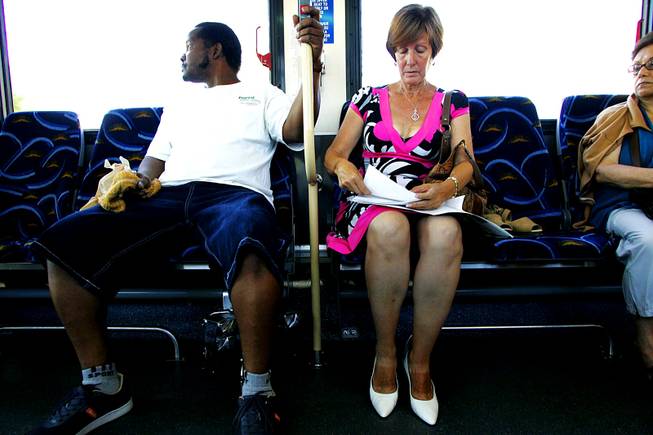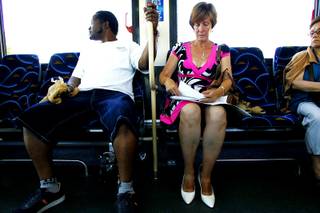
Sam Morris / Las Vegas Sun
While riding a bus to North Vista Hospital to inquire about any open positions, Peggy Tauber arranges her resumes and paper work while job searching Tuesday, July 13, 2010.
Monday, July 19, 2010 | 2 a.m.
WHY THEY STAY
Counselors and residents at Shade Tree believe women are staying longer with abusive mates because with so few available jobs, they feel an abusive home is better than starving on the streets.
Beyond the Sun
When she was a young woman, Peggy Tauber was on top of the world.
She loved her job as a secretary, was married, had a child and a beautiful home.
Then life threw Peggy a few curve balls.
She divorced her husband after seven years. She lost the beautiful home, the comfortable lifestyle.
But she still had a job and her daughter.
At least until the Great Recession.
Peggy lost her job in 2008. She found work at a fast-food restaurant, making just above minimum wage. When that job disappeared she moved in with her adult daughter and her boyfriend, hoping to buy some time so she could get back on her feet.
But a new job never materialized and before she knew it the boyfriend, she said, went from treating Peggy as a welcomed guest to using her as a punching bag.
On her 61st birthday, she clipped on her dog Kelly’s leash and walked out the door. She ended up at Shade Tree, the shelter for homeless and abused women.
“I came to a point where I said to myself ‘I’m not taking this anymore,’ ” Peggy says. “I want to be treated with respect.”
Peggy is one of tens of thousands of women in the United States who have fled abusive relationships since the recession began.
National studies have long shown that economic hardship is a leading factor in domestic violence and that abuse increases in recessions.
The problem has grown so widespread amid the Great Recession, that even the United Nations has addressed it.
In a September 2009 address on the struggling world economy, U.N. Deputy Secretary-General Asha-Rose Migiro cited a U.N. survey that found a 75 percent increase in demand for services at American shelters for battered women in 2008 over 2007 levels.
“We have seen rising levels of despair and frustration in families and communities around the world, exacerbating violence against women,” she said.
A Justice Department study in March found that the persistent unemployment and high rates of foreclosures unique to this recession have made family stresses particularly high, resulting in increased incidents of domestic violence.
The report said this was due to both decreased social pressure to not abuse the spouse and the increased opportunity for abuse to occur amid unemployment and social isolation.
Evidence of increased abuse is on the faces of the women who have sought refuge at Shade Tree and the two other Las Vegas Valley shelters. Nevada has the highest foreclosure and unemployment rates in the country, and the shelters report an increase in demand for services since the recession and foreclosure crisis began. And domestic violence arrests rose 25 percent from 2005 to 2009, according to Metro Police.
And many abuse victims are turning to shelters such as Shade Tree.
In 2007, the shelter provided 73,000 “bed nights” for women and their children, says Marlene Richter, Shade Tree’s executive director. In 2008 the tally jumped to 98,000 bed nights. Last year it was more than 100,000. And the numbers have not gone down this year, she says.
Many of the families were facing life on the streets simply because they had no money to pay for a roof over their heads. But about 35 percent of the women and 50 percent of the children are there because they had to flee abuse and had nowhere else to go, Richter says.
The volume and ferocity of the violence has shocked even a hardened shelter administrators like Richter.
“We’re seeing the survivors are in such bad shape when they’re coming in,” Richter said. “No abuse is OK, but there’s more violence, more body harm has happened to these women and their mental state is so much more diminished.”
Since the recession began, twice as many of the women have needed intensive counseling. She’s had to hire outside therapists to help the overwhelmed staff meet the demand for counseling.
“Frequently they’re suicidal, they have no hope,” Richter said. “It’s that feeling that there’s nowhere to go and no way to improve their situation.”
The lousy economy has affected battered women on two levels.
Counselors and residents at the shelter believe women are staying longer with abusive mates because with so few available jobs, they feel an abusive home is better than starving on the streets.
In better times, the women might have found help by spending a day or two with family or friends. But that support group is fractured, too, because of the economy, Richter says.
“Their friends are leaving, their family are leaving. That support network is eroding. And so people aren’t seeing what’s happening at home and there’s no buffer, no opportunity for things to cool off.”
At Shade Tree, women get job skills training, career coaching and help finding jobs.
But those jobs are scarce.
It is taking women an average of three times as long, since before the recession, to find jobs and save up enough money to move out of Shade Tree. It used to take the women two to three weeks to find jobs. Today it takes six to eight months. And the jobs they’re finding are generally lower paying and part time, so it takes them longer to save up enough money to move out.
Peggy has been in the shelter since early March, and her daughter, herself now a victim of abuse, has since joined her. Peggy hopes they can heal together.
Peggy has been looking for work for more than three months. She’s ready to be out on her own, just as soon as she can afford it.
She has updated her resume, sharpened her office skills, and practiced interviews. And every day she hikes up and down the streets of Las Vegas, submitting resumes. She spends hours each week following up on the phone, hoping for a bite.
So far, she hasn’t had so much as an interview.
Still, her confidence grows with each day. It gets easier to approach shopkeepers and office managers. She’d like to land a job in an office or do security work.
“But honestly I’ll go back to fast food work, anything to get out on my own again,” she says. “Work is work. In this economy I know I can’t be choosy. I’ll take what I can get. It’s called survival.”
Shelter staff say if anyone can do it, Peggy can. She recovered her confidence more quickly than most and her positive attitude has been an inspiration to other women at the shelter.
Peggy credits her Christian faith for helping her keep her chin up and her resolve strong.
“The recession has been hard and I do have my dark moments, but you can’t sit and mope about it,” Peggy says. “There is work out there. It’s harder to find than before the recession, but I can’t just wait for things to get better. I have to get out there and be persistent. That’s the only way to get what I want out of life.”


Join the Discussion:
Check this out for a full explanation of our conversion to the LiveFyre commenting system and instructions on how to sign up for an account.
Full comments policy